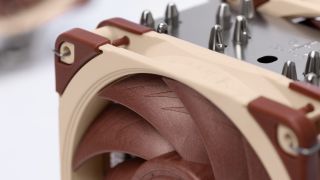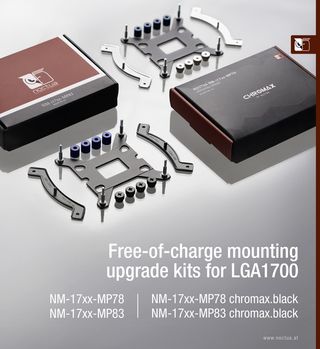Popular Coolers Incompatible with Some LGA1700 Motherboards
Compatibility with coolers plagues some LGA1700 motherboards.

Noctua, along with some other makers of coolers, introduced mounting kits for their existing cooling systems that enable installation on LGA1700 motherboards in time for Intel's Alder Lake launch last month. Now it turns out that several existing coolers are not compatible with some Asus motherboards. But, of course, that would never be a problem if there were loads of native LGA1700 coolers around.
Noctua has updated its socket compatibility list to reflect that its popular high-performance NH-D15, NH-U12S, and NH-U12A air coolers are not mechanically compatible with Asustek's ROG Strix Z690 and upcoming B660 motherboards even with the LGA1700 mounting kits, reports Guru3D. Noctua's coolers are among the best CPU coolers around, so their incompatibility with select Asus platforms will upset many.
As it turns out, the heatsink that covers the VRMs on the Asus motherboards is large enough to interfere with Noctua's NH-D15, NH-U12S, and NH-U12A air coolers, which are pretty large.
For now, Noctua only mentions select motherboards from Asus (i.e., other motherboards that Noctua has tested are fully compatible with its coolers). Still, the same problem can affect other platforms too (including the upcoming ones) since makers of mainboards tend to install large heatsinks on VRMs in a bid to maximize overclocking capabilities of their products. Furthermore, there are coolers from other makers with large heatsinks that may be incompatible with some LGA1700 motherboards.

It is necessary to note that some makers of mainboards added holes for LGA115x coolers to their LGA1700 platforms since there are many high-performance air and liquid coolers around that easily cool-down Intel's latest 12th- Generation Core 'Alder Lake' processors. The only problem with these holes is that LGA1700 CPUs are lower compared to LGA115x processors, so a brand-new mounting kit is needed to ensure proper contact between the cooler and the IHS.
But the biggest problem is not incompatibility between some coolers and some LGA1700 motherboards. The problem is that as of now there are not so many native LGA1700 coolers around, which could be a problem for some users.
Stay on the Cutting Edge
Join the experts who read Tom's Hardware for the inside track on enthusiast PC tech news — and have for over 25 years. We'll send breaking news and in-depth reviews of CPUs, GPUs, AI, maker hardware and more straight to your inbox.

Anton Shilov is a Freelance News Writer at Tom’s Hardware US. Over the past couple of decades, he has covered everything from CPUs and GPUs to supercomputers and from modern process technologies and latest fab tools to high-tech industry trends.
-
mikewinddale I'm curious: when people transplant a cooler from their old computer to build their new computer, what do they tend to do with their old computer? Do they buy a new cooler for the old computer? Or do they scrap the entirety of the old computer, even though it still works, simply because the CPU no longer has a heatsink?Reply -
eye4bear All these issues sure seem like Intel has rushed the new processors into production as it appears the MB and cooler makers did not get 1700 specs and test units enough ahead of time.Reply -
hotaru251 considering how toasty 12th gen is basically negatign use of noctua on asus MB is a big negative for those MB.Reply
sell its parts or turn it into a NAS likely top 2 choices.mikewinddale said:Or do they scrap the entirety of the old computer, even though it still works, simply because the CPU no longer has a heatsink? -
rad666 Reply
I always either sold the leftovers for parts or given them to friends.mikewinddale said:I'm curious: when people transplant a cooler from their old computer to build their new computer, what do they tend to do with their old computer? Do they buy a new cooler for the old computer? Or do they scrap the entirety of the old computer, even though it still works, simply because the CPU no longer has a heatsink? -
JTWrenn These are actually in my mind, mobo makers being idiots. You know what fans are popular and how big they are. Make the space, and stop putting massive passive cooling all over the place without thinking about cooler size.Reply
The idea that this is an Intel issue makes little sense, because if it was then all mobos would be having the problem.
New socket check your coolers before buying and mobos need to keep more space for these coolers. End of story. -
velocityg4 Reply
For me the old system usually remains mostly whole. Except for data drives and maybe GPU. It then get downgraded to another role in life. Like a media server where it gets the old media server storage array. The new build gets a new heatsink.mikewinddale said:I'm curious: when people transplant a cooler from their old computer to build their new computer, what do they tend to do with their old computer? Do they buy a new cooler for the old computer? Or do they scrap the entirety of the old computer, even though it still works, simply because the CPU no longer has a heatsink?
But my computers get 10-15 years use. As they cycle to different functions. -
drtweak Replymikewinddale said:I'm curious: when people transplant a cooler from their old computer to build their new computer, what do they tend to do with their old computer? Do they buy a new cooler for the old computer? Or do they scrap the entirety of the old computer, even though it still works, simply because the CPU no longer has a heatsink?
Thats why you always keep the stock cooler and toss it on once you no longer need the PC lol -
PapaCrazy ReplyJTWrenn said:These are actually in my mind, mobo makers being idiots. You know what fans are popular and how big they are. Make the space, and stop putting massive passive cooling all over the place without thinking about cooler size.
The idea that this is an Intel issue makes little sense, because if it was then all mobos would be having the problem.
New socket check your coolers before buying and mobos need to keep more space for these coolers. End of story.
It's specifically Asus. They screwed up big time this generation. Their high end Hero boards are ludicrously expensive, and their entire "mid-tier" (and still expensive) Strix lineup has these compatibility issues.
Every other z690 mobo on the market from Gigabyte, MSI, Asrock, etc. are compatible with large Noctua air coolers - and are much more affordable. Asus' arrogance in pricing and design has reached laughable levels. I still can't forget their z390 boards with 4-phase VRM they tried to sell as an 8-phase. -
Replymikewinddale said:I'm curious: when people transplant a cooler from their old computer to build their new computer, what do they tend to do with their old computer? Do they buy a new cooler for the old computer? Or do they scrap the entirety of the old computer, even though it still works, simply because the CPU no longer has a heatsink?
I will generally replace the motherboard and CPU only (given that the RAM has been compatible for ages), then sell the old motherboard and CPU as a bundle, or use it to upgrade one of my other computers if I have one that is lower spec.
Every now and then I will end up with enough parts to build a new system, minus the cooler. So buy a cooler and sell the system.
Except GPU scalping put that practice to a sudden stop. With GPUs here as much as 4 times MSRP I haven't bought a GPU in almost 2 years. Everything else has gone up too, but not as much as GPUs
Most Popular


